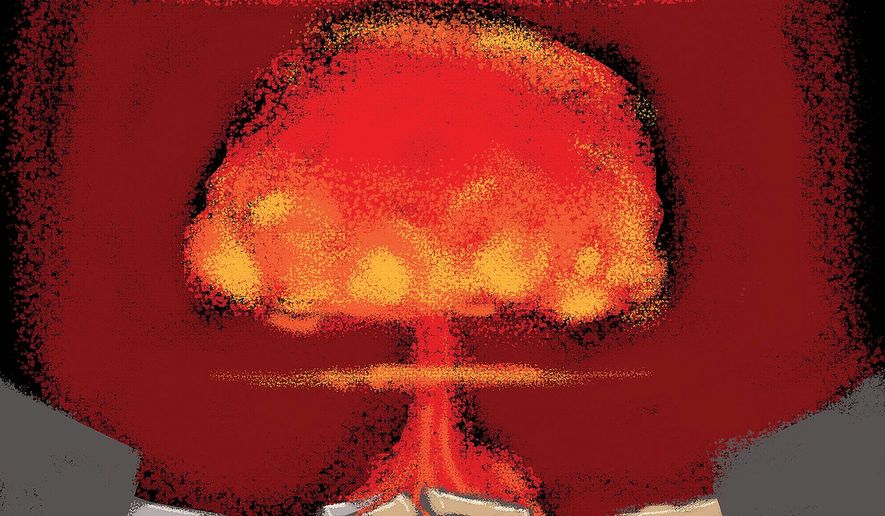OPINION:
The Syrian civil war has dropped off of most people’s radar. When it does intrude, reports primarily concern themselves with tactical advances of one side (currently victory favors the Assad regime) or the other. Some reports highlight the human rights atrocities and the effect of the war on the civilian population.
A U.N. report was delivered to the U.N. Security Council on March 1, 2018, which has not been publicly released, but obtained by the author, highlights the military cooperation between North Korea and the other rogue regimes. Further, the report also highlights cyberwarfare (including attacking the U.N. panel of the report) designed to steal military secrets and conventional weapons sales.
It highlights four methods that North Korea uses to flout international sanctions: “exploiting global oil supply chains, complicit foreign nationals, offshore company registries and the international banking system.”
Although the relationship with the Assad regime in Syria over WMD (weapons of mass destruction) cooperation is the most critical, the report also illustrates the North Korean military relationship with Mozambique for conventional weapons and parts, as well as a murky military relationship between North Korea and Sudan, despite official Sudanese denials.
More disturbing is the relationship with the genocidal regime in Burma. This includes not only banned conventional weapons but ballistic missiles. The panel continues to be concerned about Angola, Uganda, Libya, Tanzania, and Zimbabwe. These military deals emanate from North Korea’s governmental unit that engages in this, the Korea Mining Development Trading Corporation (KOMID).
The U.N. report makes clear that North Korea does not need to rely on foreign engines for its ballistic missile program, indicating the upward advance of its domestic arms capabilities.
It is the relationship with Syria that is most concerning. There is history to this alliance dating back to the 1960s when North Korean pilots flew missions for the Syrian air force and when the elder Assad imported missiles and North Korean experts to assist in Syria’s weapons program. North Korean soldiers assisted Syria against Israel in the Yom Kippur War of 1973.
Syria leaped into nuclear weapons in the 21st century. As a result, in 2007 Israel destroyed a Syrian nuclear reactor suspected of creating the means to produce nuclear weapons. Former CIA Director Mike Hayden stated that this Syrian reactor was an exact copy of one in North Korea. This North Korean/Syrian complicity is reinforced by the fact that at least 10 North Koreans were killed in that attack.
Currently, North Korea has shipped material for ballistic missile production and chemical weapons development. The report highlights 40 North Korean shipments from 2012 and 2017 to Syria’s Scientific Studies and Research Centre, the Syrian governmental organ that handles chemical weapons. The report also demonstrates North Korean personnel operating chemical weapons and missile facilities inside Syria. Interdicted shipments by U.N. member states confirm this pattern of behavior.
The report does not explain the geo-strategic situation. North Korea’s interest in the Assad regime is manifold: It seeks a partner in the Middle East to test weapons; it understands that a strong Assad regime can frustrate American foreign policy goals; American attention drawn to conflict in the Middle East weakens it position in East Asia; it provides desperately needed funds to a regime that has little else to trade or sell, and bolstering the Assad dictatorship hurts America’s ally Israel.
Syrian parliamentary speaker Hammouda Sabbagh stated, “The DPRK and Syria are in one trench against a common enemy The more terrorists that fall under the blows of the Syrian Arab Army, the faster the Zionist enemy, the United States and their agents in the region rush desperately to strike Syria, So the response to these attempts were qualitative and will be harsher and more qualitative if the enemy once again considers an attack on Syrian sovereignty.”
It is clear from the report that the much-touted sanctions regime is failing, providing a thin veil for U.N. member states like Russia and China that continue to assist North Korea’s trade exports in iron, coal, steel, silver, copper, zinc, nickel and imports of oil. It outlines elaborate efforts by North Korea and complicit partners to use false flags and documentation, evasive travel routes, transshipment and ship-to-ship transfers.
The U.N. report should be publicly and widely disseminated, but more importantly, it is the final nail in the vampire’s coffin of the 2013 agreement that the Assad regime abandon chemical weapons. It provides proof positive that rogue regimes such as North Korea, Syria, Iran, and now Burma, bolstered by Russia and China are the prime actors of instability dooming the world to further chaos and violence — this is state terrorism at its worst.
• Lamont Colucci is associate professor of politics at Ripon College and author of “The National Security Doctrines of the American Presidency: How they Shape our Present and Future” (Praeger, 2012).




Please read our comment policy before commenting.